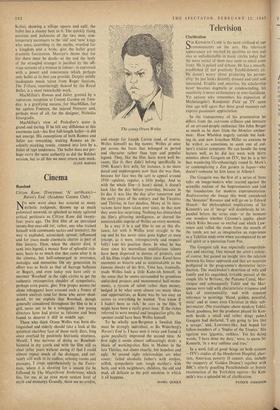Television
Clarification
Sul KENNETH CLARK is the most civilised of our commentators on the arts. His television appearances are marked by qualities so rare and also so unfashionable in many circles today that the mere recital of them may seem to entail some irony. He is poised and urbane. He has a smooth, established (if not positively Establishment). air. He doesn't worry about projecting his person- ality; he just looks decently dressed and cool and interested. Erudite and sensitive, his scholarship never becomes dogmatic or condescending, his sensitivity is never exclamatory or over-fastidious. Yet anyone who remembers his exposition of Michelangelo's Rondanini Pieta on TV some time ago will agree that these good manners can express passionate appreciation.
In the transparency of his presentation he differs from the sickroom stillness and intensity of an art-and-people enthusiast like John Berger as much as he does from the Monitor anchor- men: Huw Wheldon eagerly outside but look- ing in, and now Jonathan Miller so anxious to be with-it as sometimes to seem one of cul- ture's trickier symptoms. He can handle the long lecture well, as he did last week with thirty minutes about Gauguin on ITV, but he is at his best wandering life-enhancingly round St. Mark's or contemplating a Zen garden in Japan—why doesn't someone let him loose in Athens?
The Gauguin was the first of a series of three talks on image-makers who reacted against the scientific realism of the Impressionists and laid the foundations for modern experimentation. Rediscovering the image this week considered the `douanier' Rosseau and will go on to Edvard Munch: the philosophical implications of Sir Kenneth's use of 'image' will doubtlessly be ex- panded before the series ends—at the moment one wonders whether Cdzanne's apples, about which Rilke became so excited and which Law- rence said rolled the stone from the mouth of the tomb, are not as imaginative an experience as a Tahitian nude even when accompanied by an evil spirit or a quotation from Poe.
The Gauguin talk was expectedly comprehen- sive and exciting. One missed the artist's colour, of course, but gained an insight into the relaticin between his linear approach and that art nouveau prefigured in the programme's decorative intro- duction. The stockbroker's desertion of wife and family and his anguished, irritable pursuit of the simple life in Brittany, the Panama Canal, Mar- tinique and subsequently Tahiti and the Mar- quesas were told with characteristic crispness and lack of sentimentality, and with constant reference to paintings 'bland, golden, peaceful, static' and at times even Christian in their sub- ject-matter. (No travelogue about modern Tahiti, thank goodness, but the producer placed Sir Ken- neth beside a small and rather dingy palm.) Gauguin had declared, 'I am going to live like a savage,' and, Lawrence-like, had hoped for fellow-members of a 'Studio of the Tropics.' His egotism was 'gigantic, ruthless.' Yet his dying words, 'I have done my duty,' were, to quote Sir Kenneth, 'in a way sublime and true.'
In a week full of good things on both systems —ITV's studies of the Henderson Hospital, abor- tion, American poverty (I cannot, alas, include the snippetry of `Golden Drama') together with BBC's utterly gruelling Passchendaele or breezy examination of the Yorkshire squires—Sir Ken- neth's was a splendid bit of clarification.
PATRICK ANDERSON

































 Previous page
Previous page